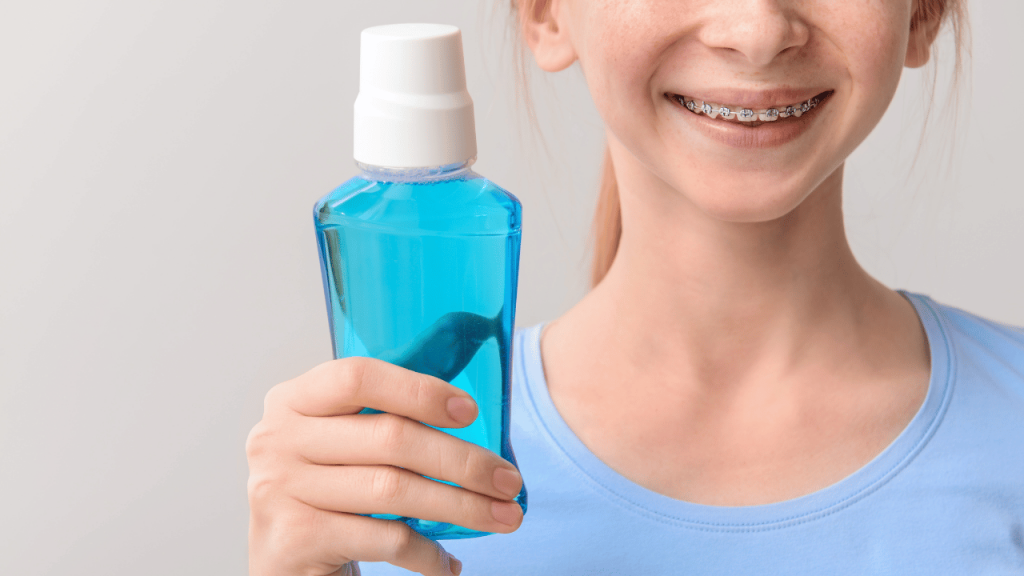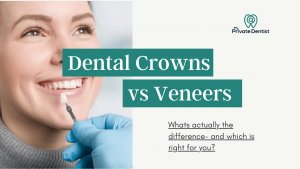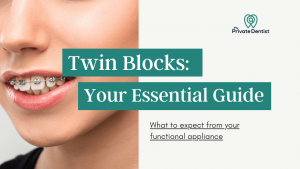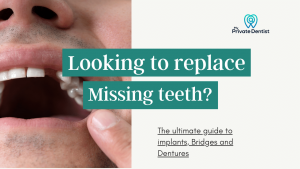These are my recommendations for the best mouthwash for braces in 2024.
As a dentist who is currently in braces, I’m getting to know first-hand the difficulties of maintaining excellent oral hygiene while wearing a fixed appliance.
Using a good mouthwash, one with all the right ingredients, can drastically reduce your chances of developing tooth decay and enamel demineralisation.
There are also mouthwashes that can help soothe cheeks and soft tissues, which may have become sore from rubbing on your braces.
Why do I need to use mouthwash when I have braces?
While great for aligning teeth, braces create numerous nooks and crannies that can trap food particles and plaque, leading to a higher risk of dental issues.
This makes following a meticulous cleaning routine crucial, with mouthwash being an important component.
Not only does it reach areas that brushes and floss might miss, but it also helps reduce bacteria in the mouth and freshen breath.

Why Choosing the Right Mouthwash Matters?
Choosing the right mouthwash when you have braces isn’t simply about picking the most refreshing flavour. It requires considering formulations that are effective in fighting specific problems, such as increased plaque formation and risk of demineralisation which can lead to white spots on teeth.
A suitable mouthwash for braces should contain at least 225ppm fluoride to reinforce tooth enamel and preventing decay. Additionally, an alcohol-free option is recommended as alcohol can lead to mouth dryness and a burning sensation when swilling.
Some mouthwashes offer anti-cavity properties, while others have anti-inflammatory ingredients to soothe irritated gums, which is common with brace adjustments.
When selecting a mouthwash look at the ingredients to ensure they target oral care concerns specific to orthodontic patients.
REMEMBER: Mouthwash alone is not enough to remove plaque from your teeth. It needs to be used in conjunction with a good electric toothbrush and interdental aids, in order to deliver a healthy and clean oral environment.
How I tested for the best mouthwash for braces?
To determine the best mouthwash for braces, I conducted a thorough evaluation. Initially, I researched the ingredients of several mouthwashes designed for individuals with braces, focusing on their effectiveness. Subsequently, I personally tested each of these mouthwashes over the course of a week.
In addition, I utilised plaque disclosing tablets to assess their ability to remove debris from my teeth and evaluated their overall pleasantness and refreshment during use. (Scores out of 10)
My 3 Top Picks for Mouthwash for Braces
Best Mouthwash for Braces Overall – Colgate FluoriGard Daily Rinse
Best Mouthwash for Adults with Braces – Listerine Advanced Nightly Reset Mouthwash
Best Mouthwash for Sore gums and Ulcers – Vitis Orthodontic Mouthwash
Best Mouthwash for Fixed Braces
Colgate FluoriGard Daily Rinse
Key Features
Clinically Proven (1)
0.05% Sodium Fluoride (225ppm)
Alcohol Free
Plaque reduction score: 7/10
Freshness: 7/10
Why our dentists recommend this mouthwash:
Colgate FluoriGard Daily Rinse is the mouthwash that I recommend most to patients with braces in my clinic.
Using this mouthwash, I had fewer worries about sugar-induced cavities and demineralisation. The fluoride level is adequate to do its job in shielding teeth from sugar and acid attacks.
Finding a mouthwash that doesn’t set your mouth on fire when you’re trying to freshen up can be tough. That’s where this mouthwash stands out — the peppermint flavour packs a punch without the sting, which is exactly what you need.
Its comfortable to use. The alcohol-free formula doesn’t aggravate the mouth whilst swishing around those delicate teeth (and trust me I know how delicate your teeth can be, especially when you’ve just had your braces tightened)
While the big bottle ensures you won’t run out any time soon, it does make you think twice before tossing it into your overnight bag. However, the peace of mind I get from using it is worth the trade-off.
Pros
- Provides good cavity protection due to its fluoride content
- Powerful peppermint flavour for long-lasting freshness
- Alcohol-free formula is gentle on sensitive mouths with braces
Cons
- Slightly more expensive compared to some other brands
- Large bottle might be less convenient for travel
- Limited flavour range
Best Mouthwash for Adults with Braces
Listerine Advanced Nightly Reset Mouthwash
Why our dentists recommend this mouthwash:
Listerine Nightly Reset contains a higher level of fluoride (450ppm) which provides an even more effective level of protection and remineralisation for teeth. This formulation is not recommended for children (under 12s) as ingestion of fluoride increases risk of fluorosis. This is when fluoride is taken up into developing teeth and shows up as white flecks when they erupt.
Its best used at night as instructed, as it stays on the teeth and helps strengthen enamel while you sleep.
The overall flavour is a nice balanced refreshing mint, and not too strong. It also doesn’t contain SLS or alcohol so doesn’t burn like other Listerine products you may have tried.
The bottle is recyclable, perfect for those looking for green credentials.
Pros: Excellent Cavity Protection, Balanced flavour, SLS Free
Cons: Cost
Mouthwash for Gum care and Inflammation
Vitis Orthodontic Mouthwash
Why our dentists recommend this mouthwash:
Vitis Orthodontic Mouthwash is a great all-rounder as it contains ingredients which also helps to soothe gums and soft tissues.
Cetylpyridinium Chloride (CPC), a versatile oral antiseptic, helps to reduce adherence of dental plaque. It removes bacteria and curbing and protects the oral environment from plaque-related complications, such as sore gums and tooth decay.
Allantoin stimulates the repair of tissue damaged by the friction of braces and the development of ulcers. It acts as a soothing balm, helping damages soft tissues to heal.
Aloe Vera promotes the well-being of the gums and helps fight gingival inflammation. These added benefits are great if you find your gums are getting sore or you’re more prone to getting ulcers now you have braces.
Pros:
- As well as Fluoride, you also have three ingredients which help soothe soft tissues
- Lovely Apple Mint Flavour
Cons:
- More expensive than Fluoriguard
Buying guide – Factors to Consider When Choosing a Mouthwash for Braces
When choosing a mouthwash for braces, there are several factors to consider. It’s important to select a product that is gentle yet effective in cleaning around the braces and maintaining overall oral health. Here are some key factors to keep in mind when making your selection:
Alcohol-free vs. alcohol-based mouthwash
Opting for an alcohol-free mouthwash over an alcohol-based one is particularly advantageous, especially for individuals with braces. Alcohol-free mouthwashes are gentle on the sensitive oral tissues, reducing the likelihood of irritation and dryness, which can be exacerbated by the presence of braces.
The absence of alcohol ensures a milder and more comfortable experience. Additionally, alcohol-free mouthwashes are less likely to cause a burning sensation, making them a more tolerable choice for those with sensitive gums or oral sores.
Furthermore, alcohol-free mouthwashes are just as effective in reducing plaque, using Xylitol instead as a bacterial inhibitor.
Fluoride vs. Non-Fluoride
Choosing a fluoride mouthwash over a non-fluoride option is highly beneficial. Fluoride plays a crucial role in preventing decay (1) and remineralising enamel, which is particularly important when braces make it challenging to clean teeth thoroughly.
The presence of brackets and wires can create areas where plaque and food particles easily accumulate, increasing the risk of decay. By using a fluoride mouthwash, you can provide an extra layer of protection for the teeth, helping to strengthen enamel and counteract the effects of acid attacks.
Fluoride mouthwash can also help prevent demineralisation and the formation of white spots on the teeth after braces are removed. These white spots, known as enamel decalcification, can develop when plaque accumulates around the brackets and leads to a loss of minerals from the enamel.
Flavours
Fruity flavors can offer a pleasant and refreshing experience, potentially making the oral care routine more enjoyable for some individuals. Additionally, flavor-free options may be preferred by those who are sensitive to strong tastes or have specific dietary restrictions.
On the other hand, minty flavors, when mild and not overly strong, can provide a refreshing and invigorating sensation without overwhelming the palate.
This is best as the mild minty flavour can help combat any lingering aftertaste from other oral care products while still providing a pleasant overall experience.
Sensitivities
When choosing a mouthwash for individuals with sensitivities and allergies, it’s crucial to carefully review the product’s ingredients to avoid potential adverse reactions. Some common allergens and sensitivities to consider include:
- Alcohol: Individuals with sensitivities to alcohol should opt for alcohol-free mouthwashes to prevent irritation and dryness of the oral tissues.
- Artificial Flavors and Colors: Some patients may have sensitivities or allergies to artificial flavors and colors commonly used in mouthwash. Choosing a product with natural flavors and colours can help avoid potential reactions.
- Fragrances: Mouthwashes containing fragrances may trigger sensitivities in some individuals.
- Allergens: Individuals with known allergies to specific ingredients, such as certain preservatives or sweeteners, should carefully review the product label to ensure that the mouthwash does not contain any allergens that may cause an adverse reaction.
Sustainability
Look for mouthwash products with sustainable packaging and eco-friendly options to support environmentally conscious braces care practices.
By choosing mouthwash products that prioritize sustainability, individuals can contribute to environmental conservation while maintaining their oral hygiene. Look for recyclable or biodegradable packaging, as well as products that are manufactured using eco-friendly processes.
Additionally, some brands offer refillable mouthwash options, reducing plastic waste and promoting a more sustainable approach to oral care. Prioritising sustainability in mouthwash selection aligns with eco-conscious practices and supports efforts to reduce environmental impact.
How to Use Mouthwash with Braces:
- Pour the recommended amount of mouthwash into a cup.
- Take a small sip of the mouthwash and swish it around your mouth for 30 seconds to 1 minute.
- Gently move the liquid through your teeth and around your braces to ensure thorough coverage.
- Avoid swishing too vigorously to prevent dislodging any braces or causing discomfort.
- Spit out the mouthwash into the sink.
- Refrain from eating or drinking for at least 30 minutes after using the mouthwash to allow it to take full effect.
Why Trust Us
Our review team comprises dental professionals with extensive experience in orthodontic care and oral hygiene. Our credentials include degrees in dentistry, orthodontics, and oral health, along with years of practical experience in treating patients with braces.
Our review process involves thorough research into various mouthwash products, citing clinical studies, and considering factors such as alcohol content, fluoride levels, antibacterial properties, and suitability for individuals with braces.
Recommendations are based on unbiased analysis and genuine concern for the oral health and comfort of individuals with braces. We prioritise the well-being of our readers and strive to provide trustworthy guidance for selecting the best products for our patients.
Frequently Asked Questions (FAQs)
Can I use any mouthwash with braces?
It’s best to use an alcohol-free and orthodontist-recommended mouthwash to avoid irritation and maintain oral health.
How often should I use mouthwash with braces?
It’s generally recommended to use mouthwash with braces at least once a day, preferably at a different time to brushing and flossing.
Can mouthwash help with bad breath caused by braces?
Yes, a mouthwash with antibacterial properties can help reduce bad breath associated with braces by killing odor-causing bacteria.
Will mouthwash stain or damage my braces?
When used as directed, mouthwash should not stain or damage braces.
Additional Oral Care Tips for Braces:
Use a fluoride toothpaste and brush after every meal to prevent plaque buildup and maintain oral hygiene.
Floss daily using orthodontic floss threaders or interdental brushes to clean between braces and teeth.
Consider using a water flosser to effectively clean around braces and remove food particles.
Attend regular dental check-ups to monitor oral health and address any issues promptly.
Avoid hard, sticky, or sugary foods that can damage braces and increase the risk of cavities.
The Verdict
Maintaining excellent oral health while wearing braces is crucial for a successful orthodontic treatment.
By following a consistent oral care routine, including the use of suitable mouthwash, you can minimize discomfort and achieve a healthy, beautiful smile.
My top picks for mouthwash for braces are alcohol-free options with fluoride and antibacterial properties, such as Colgate FluoriGard Daily Rinse or Listerine Nightly Reset, which are recommended for effective and comprehensive care.
I’ve also tested and written articles about the best toothbrush for braces and best floss for braces. By using these recommended products, your experience with braces can be as comfortable and trouble-free as possible.
Always consult a dentist or orthodontist if you’re having persistent issues with your teeth or braces.







